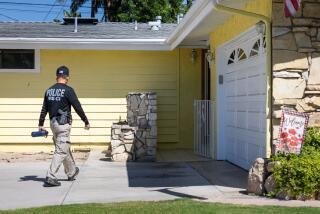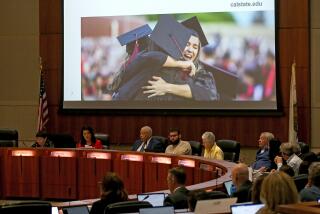Ex-Credit Union Manager Investigated : Embezzlement: The veteran head of the city employees institution is suspected of skimming $500,000 for personal use.
- Share via
COVINA — The FBI is investigating the 20-year manager of a defunct credit union for Covina city employees, who is suspected of embezzling hundreds of thousands of dollars from the institution and leaving it insolvent.
The attorney for Dolores Wysocki, 65, confirmed that the FBI is investigating his client, who resigned from the Covina City Employees Federal Credit Union in July.
Wysocki has not been charged with a crime, and is living in Santa Paula in Ventura County.
Wysocki could not be reached for comment. Her attorney, Howard Gillingham, said: “We have been cooperating 100% from the beginning of the investigation. There’s a reported problem and everyone is cooperating.” He declined to comment further.
The Covina credit union was purchased several weeks ago by the San Gabriel Valley Public Schools Credit Union in El Monte. But before that could happen, the National Share Insurance Fund, a federal insurance agency, pumped $400,000 into the ailing Covina credit union to make it solvent.
Officials with the schools credit union said they sent a criminal complaint to the U.S. Justice Department and the FBI last August, alleging that Wysocki embezzled as much as $500,000 over the last 10 years from the tiny Covina credit union with assets of only $1.2 million.
Those officials have found canceled checks showing that Wysocki simply wrote checks for cash against the credit union’s account, which she allegedly used to pay personal bills, according to Darleen Kincaid, executive vice president of the schools credit union. Kincaid said bogus loans were set up on paper to account for the missing money.
Kincaid said an initial examination of the Covina credit union by the National Credit Union Administration, a federal regulatory agency, early last summer indicated the institution’s records were out of balance and out of date. She said her ensuing two-month investigation found that the credit union was “in the hole close to $1 million.”
However, she said, credit union members’ money was never at risk because it was federally insured.
A thorough audit of the Covina credit union was necessary, she said, because the schools credit union wanted to determine its financial health before allowing a possible merger. The Covina credit union’s board of directors sought the merger because the schools credit union could offer services, such as auto loans and checking accounts, that the small Covina institution couldn’t.
In July, shortly after Wysocki resigned, the schools credit union began operating the Covina credit union on a contract basis.
FBI supervisory special agent Charles Fields of the bureau’s West Covina office would not name the suspect in the seven-month investigation into the allegations made by the schools credit union. But, he said, “we’re looking at an individual in the Covina credit union and there was only one (employee), so that narrows it down.”
Also, he said, “we’re looking at embezzlement as the primary cause of the bank’s (insolvency).”
Officials say the credit union’s manager and only employee for about the past 20 years was Wysocki, who sources close to the former credit union described as amiable and well-known by the credit union’s 300 members and other city employees. They said she lived in Hacienda Heights until October, when she moved to Santa Paula.
Kincaid said that, in discussions among herself, Wysocki and the FBI, Wysocki has acknowledged illegally taking about $300,000 from the Covina credit union, though Wysocki was not sure of the exact amount or time period. Also, Kincaid said, Wysocki and her lawyer have indicated they will make an effort to pay back some of the money.
Fields at the FBI would not confirm such discussions, saying only that the suspect “appears to be cooperating up to this point.” He said he expects his office to forward a report to the U.S. Attorney’s Office, which would decide whether to prosecute, within 60 days.
Jim Baylen, deputy regional director of the National Credit Union Administration in San Francisco, said annual audits required by federal law should have uncovered any shoddy bookkeeping or misappropriation of funds at the Covina credit union.
Kincaid said such audits were performed over the past 10 years at the Covina credit union, but apparently they were not thorough enough. Board members of the Covina credit union said they had thought their institution’s capital was dwindling because membership was slowly dropping as the city cut back its work force.
More to Read
Sign up for Essential California
The most important California stories and recommendations in your inbox every morning.
You may occasionally receive promotional content from the Los Angeles Times.










